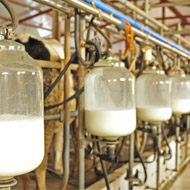
Farmers expected to switch to less-critical products
The Tesco Sustainable Dairy Group (TDSG) plans to cut its use of critical antibiotics, according to a report by Farmers Weekly.
The report states that the retailer has published new protocols which advise members not to use Critically Important Antibiotics (CIAs) unless there is clear evidence that they are absolutely necessary.
The World Health Organisation defines CIAs as those antibiotics that are most important to human health. They include third and fourth generation cephalosporins, fluoroquinolones and certain penicillins.
In September 2016, Defra committed to reduce its use of antibiotics in animals farmed for food to an average of 50mg/kg by 2018.
Speaking to Farmers Weekly, Professor Rob Smith, who advises Tesco on antimicrobial issues, said the new guidance would still enable vets to prescribe CIAs. However, vets would need to conduct sensitivity and culture tests to ascertain if the organism would respond to other treatments.
Mr Smith, a professor of Veterinary Science at the University of Liverpool, explained that if the tests revealed less-critically products could be used, farmers would be expected to switch.
“In the farm protocol, the first line of defence should not be a critically important product. If it is, there will need to be evidence that it is required,” he said.
This is not the first time a retailer has announced plans to restrict the use of CIAs in its supply chain. In October 2015, Arla’s producers were asked to use selective dry cow therapy, having discussed and agreed on the use of antibiotics with their vet.
Figures published by Defra in November 2016 revealed that sales of antibiotics for food-producing animals fell by 10 per cent, putting the UK on course to meet its 2018 target.



 The Veterinary Medicines Directorate (VMD) is inviting applications from veterinary students to attend a one-week extramural studies (EMS) placement in July 2026.
The Veterinary Medicines Directorate (VMD) is inviting applications from veterinary students to attend a one-week extramural studies (EMS) placement in July 2026.